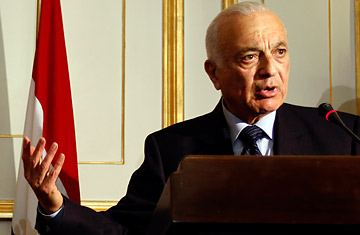
Egypt's Foreign Minister Nabil Elaraby speaks during a news conference with U.S. Secretary of State Hillary Clinton in Cairo March 15, 2011.
Reports of a thaw in Egyptian-Iranian diplomatic ties has created a stir in the Middle East, particularly in Egypt and its neighbor, Israel. Indeed, even as Egypt struggles to iron out its own emerging political system after the ousting of President Hosni Mubarak, Cairo's foreign policy is also undergoing a sea change. "If you look at Egypt over the last 20 years, it just hasn't played a very serious role in the foreign affairs of the region," says Gary Sick a Persian Gulf expert at Columbia University, who served on the National Security Council under three U.S. presidents. For decades, in fact, the regime of former President Hosni Mubarak acted as little more than a "foreign policy cardboard standup" to its powerful ally and benefactor, the United States. But all that is about to change, he says. "Many of the countries that now have new leaders are going to reset their foreign affairs," Sick predicts. "And the United States is going to have to get used to that."
For post-revolutionary Egypt's new leaders and politicians, forging a new foreign policy means pushing back against much of what Mubarak stood for. That clearly includes Egypt's perceived puppet-like status to the United States, Europe, and Israel. "Let us eat the way we want, dress the way we want. Let us organize ourselves the way we want to," says Kamal Habib, a Salafi politician, who was jailed for a decade under Mubarak for his affiliation with a violent jihadist organization. "We don't want to repeat the Mubarak-American relationship again."
Habib's opinion applies to more than just his Salafist cohorts. Many Egyptians want to hit the reset button on their country's stance on Palestinian statehood, as well as its posture toward the Gaza Strip, where it has helped to enforce an Israeli-led blockade for four years. Most recently, it also includes re-thinking a decades-old enmity with Iran.
Earlier this month, Egypt's new Foreign Minister Nabil al-Arabi called for a normalization of relations between the two countries. Tehran and Cairo cut off diplomatic ties following the Camp David Accords between Egypt and Israel and the Islamic Revolution in Iran, both of which occured in 1979. Earlier this week, reports filtered out that Iran had appointed an ambassador to Cairo, sparking a flurry of speculation on the future of the relationship. Both countries later denied that the step had been taken. But Egyptian state media reported that Iran's foreign minister has been invited to visit Cairo. And on Thursday Iran's state-run Press TV announced that Iranian tourism agencies had signed a deal with Egypt to facilitate tourism between the two countries.
For western policy-makers and the Israeli government, the newfound warmth has set off alarm bells. At the very least, they say, it's not a positive sign for the countries seeking to isolate Iran in an effort to halt its suspected work to build nuclear weapons.
